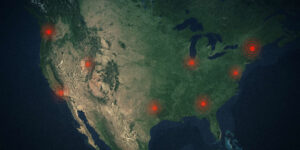The Halloween Conundrum: Should Christians Celebrate the Pagan Holiday?
When I was growing up, Halloween was my second favorite holiday. Why? The night held all the appealing elements of fun. Dressing up in costume. Spooky stories about ghosts and witches. The promise of free candy by shouting “trick-or-treat” at a neighbor’s door. Halloween was parties at school, carving pumpkins into candle-lighted jack-o’-lanterns, and playing games involving apples.
All those years, what I never asked was why we did any of it. What was the purpose of the costumes or candy, the parties or pumpkins? Why on this one night did things deemed dark or frightening become celebrated? It never occurred to me these traditions were from another time or had a purpose. Much like whistling in the dark (to ward off evil spirits), Halloween traditions were just something we did.
As an adult, I began questioning the October holiday routine. When my children were small, churches were suggesting Halloween was evil, offering alternative activities focusing on autumn or harvest. But it wasn’t until later, on a spiritual journey that drew me deep into witchcraft, that I explored Halloween’s origins.
The celebration of Oct. 31 finds its most ancient beginnings in a festival called Samhain (loosely translated “Summer’s End”). It was the final harvest for the Celtic people. They brought in the last of their crops, put up food stores, and prepared animals for slaughter or sacrifice. It was a time marked with great celebration and significance as the dark season of winter began. They would prepare a large bonfire for the community, embers from which would be used to relight individual or family hearth fires.
Samhain was also a time between times, meaning the veil between this world and the spirit realm became thin. Therefore Samhain was a time to honor the dead. Food was put on doorsteps for wandering souls. Divination was employed to discern the future. But the thinning veil also meant evil spirits could roam about seeking mischief, so masks were worn on Samhain for disguise and protection.
Harvest traditions were celebrated for thousands of years into the time Christian belief became dominant throughout the known world. Around the third century the church fathers wanted alternative festivals to offer the people, holidays that reflected the teachings of the church. All Saint’s Day was set aside to honor Christians who had died the previous year. All Hallow’s Eve came the night before, observed with prayer and fasting. When moved from their original dates in May to Oct. 31–Nov. 1, All Hallow’s Eve retained some of the harvest festival traditions. Eventually the day became associated with wild, violent behavior. When Irish immigrants brought the traditions to America in the 1800s, the problems associated with it came as well.
In the mid-20th century, community leaders made an effort to re-create Halloween as a holiday for children. In recent years the celebration has grown as adults have reclaimed the festival as their own. Newspapers list costume parties, balls, and spine-chilling events dedicated to Halloween. Stores have entire sections with candy, decorations, and a myriad of orange- and black-themed items.
As a result, we have a yearly debate among Christians regarding Halloween. Should we be concerned Oct. 31 has been restored as Samhain for Wiccans? The day is one of power for many occult practitioners. How should Christians respond to this annual celebration in our culture?
Some choose to close the curtains, turn off the light, and ignore the doorbell. While I respect that decision, there are approaches that will resonate with our unchurched neighbors, shining the light into darkness:
- Host a prayer meeting or worship night.
- Host a family Christian movie night.
- Be the neighbor who shines light (create an inviting doorway or porch) on what is a spooky night.
- Play uplifting contemporary Christian or praise and worship music that people can hear when you open the door.
- Offer the best candy along with a pocket-sized Gospel of John and a winsome tract explaining the gospel.
- Talk to your neighbors (especially if you don’t interact much the rest of the year); offer parents coffee or hot cider, especially if the evening is cold. Let people see Christ shining through you.
Kristine McGuire is author of Escaping the Cauldron (Charisma House, 2012). She spent eight years blending Christianity with the occult. Though she was an experienced witch, medium and ghost hunter, she also considered herself a Christian. She has been a Solitary Eclectic Christian Witch, a clairsentient medium and a lead investigating member of the Grand Rapids Area Paranormal Enthusiasts (GRAPE), now known as Michigan Paranormal Alliance. Her unique journey through Christianity, witchcraft and the occult gives her an informed perspective on the lure of the occult and the saving power of God. A gifted writer, her work has been featured in Faithful Devotions, Focus on the Family and Crosslinks. Kristine keeps a daily blog that has a faithful following at kristinemcguire.com.




























































